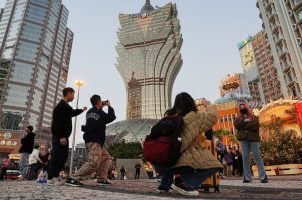Macau Concessionaires’ Debt Reduction Slow Process, Says Fitch
Posted on: February 22, 2024, 09:32h.
Last updated on: February 22, 2024, 10:50h.
Macau casino operators should benefit from rising gross gaming revenue (GGR) as tourism to the gaming enclave from mainland China increases. But the process of reducing debt could take a while.

That’s according to Fitch Ratings, which said more credit upgrades for the concessionaires aren’t likely over the near term. Earlier this month, the ratings agency upgraded Sands China parent Las Vegas Sands (NYSE: LVS) to “BBB-,” the lowest investment grade. Just days before that, Fitch reaffirmed Wynn Macau parent Wynn Resorts (NASDAQ: WYNN) at “BB-.”
The upswing in visitation and gaming revenue is likely to aid Fitch-rated casino operators with a presence in Macao in reducing their debt levels,” observed the research firm. “However, upside potential in their ratings is constrained by their elevated leverage metrics, as deleveraging will take time for some of the operators, despite the improvements.”
The recent eight-day Chinese New Year holiday, which was a day longer than usual, was a boon for Macau casino companies. Visitation for that period reached 1.4 million, topping the 1.2 million seen in 2019, according to the Macao Government Tourism Office (MTGO).
Macau Debt a Necessary Evil
Macau operators were forced to take on north of $20 billion during the coronavirus pandemic simply to stay afloat. Gaming venues in the special administrative region (SAR) didn’t reopen in earnest until early 2023.
That delayed concessionaires’ ability to make debt-reduction strides. But analysts and bondholders appear to be at peace with that, because it’s widely expected the issuers will be able to handle a spate of maturities looming this year and in 2025.
Additionally, while Macau stocks remain sluggish, there’s strong appetite among global bond investors for debt issued by Macau casino operators. That is signaling that buyers believe default risk is minimal, despite the high-yield grades on those bonds.
“We do not see significant further upside potential in the issuers’ ratings in the near term, as reflected by their Stable Outlooks,” added Fitch. “SJM Holdings’ leverage metric, in particular, remains high and is likely to fall to its rating thresholds only in 2026, in our view. There is also a risk that the recovery in Macao’s gaming revenues could be slowed by possible policies to tighten capital outflow from the Chinese mainland.”
VIP Market Still Sluggish
The Macau recovery has been led by mass and premium mass players, with VIP action still tepid due to the fractured junket business.
The VIP segment, however, is on a slower path to recovery and unlikely to return to pre-pandemic revenue levels in the near future. This slower rebound in the VIP segment can be attributable to recent years’ regulatory tightening in China’s treatment of gaming tourism and the broader economic challenges facing China,” concluded Fitch.
Recent data indicate that in the fourth quarter, MGM China and Wynn Macau — which operate a combined four venues there — gained market share, while leaders Galaxy Entertainment and Sands China ceded modest amounts of share.
Related News Articles
Sands, Wynn Among US Beneficiaries of China Reopening, Says Goldman Sachs
Macau June GGR Could Surprise to Upside, Says Analyst
Macau Searching for Las Vegas-esque Revenue Mix
Las Vegas Sands Boosting Holdings in Sands China
Most Popular
Mega Millions Reportedly Mulling Substantial Ticket Price Increase
NoMad Hotel to Check Out of Park MGM on Las Vegas Strip
VEGAS MYTHS BUSTED: To ‘86’ Someone Was Vegas Mob Slang for Murder
Most Commented
-
End of the Line for Las Vegas Monorail
— April 5, 2024 — 90 Comments -
Mega Millions Reportedly Mulling Substantial Ticket Price Increase
— April 16, 2024 — 8 Comments -
Long Island Casino Opponents Love New York Licensing Delays
— March 27, 2024 — 5 Comments
















No comments yet